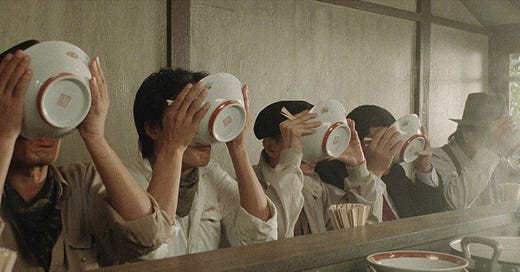Food is Connection, Eating is Communication: Tampopo (1985)
It's about unspoken ways we are capable of great care.
As Restaurant Week at Feature Presentation highlights, there is no shortage of great storytelling about food. It’s at once the most commonplace and the most miraculous thing that we as humans do for ourselves and our loved ones, and it connects to every aspect of our society. You can tell a compelling story about status through food or poverty or creativity or sensuality - the possibilities are endless. Not only that, it’s one of the most relatable foundations from which to craft a story. It’s as endlessly a diverse experience as it is a universal one.
But what I think sets a good food story apart from a great one is how effectively it’s able to use food, and more specifically cooking, as a way to communicate the subtle, unspoken ways we are capable of great care. Whether that care is for ourselves or others, food is the one major way we convey to the people in our lives where we come from, what we care about, and who we want to be. For my money, Juzo Itami’s classic Tampopo (1985) does this better than almost any other food movie out there.
Tampopo tells the story of a widowed restaurateur and ramen chef whose name supplies the title of the film. She’s played by the radiant Nobuko Miyamoto (who was also the real-life spouse of the film’s director). Tampopo runs her late husband’s noodle shop and fails at it so miserably that her son is bullied by his schoolmates. Though she possesses some talent and lots of grit, her shop is struggling and her ramen is painfully average.
Luckily for her, her son befriends two long-haul truck drivers/amateur gourmands who agree to take her under their wing and turn her shop into a success. Played with gusto and pathos by the great Tsutomu Yamazaki and Ken Watanabe as Goro and Gun, respectively, they train her with the rigor of an Olympic athlete and take her all over town to taste the competition, lighting the fire of her desire to improve herself as she lights the fire beneath her enormous vat of broth. With a wink and a nod to the tradition of samurai and ronin stories, Tampopo’s saviors push her to the limits of what she thought she was capable of until she begins to see the light and believes that she has what it takes to make truly great ramen.
Through a series of escapades and hilarious training montages, Tampopo begins to improve and is ultimately triumphant thanks to the guidance and affection of her mentors. It’s the feel-good “noodle western” that has been winning over audiences worldwide for decades, and for good reason. The story is full of whimsy, heart, romance, and humor. Tampopo’s journey from acceptable mediocrity to slurpable culinary greatness is both heart-wrenching and desperately optimistic. But what really makes the film stand out in the genre is the series of comedic vignettes that pepper the film.
The most notable departure from the main narrative is that of the Gangster in the White Suit, played by all-time great Koji Yakusho (I love his performance in Kiyoshi Kurasawa’s Cure). His mysterious and unnamed character pops up throughout the film in a series of scenes, each connected to a different experience of food. He appears in the opening, meta-comedy sketch-like scene, where he is seen scolding a fellow moviegoer for eating a noisy packet of potato chips. We also witness this suave and seedy character romancing his girlfriend in an expensive hotel room as they incorporate various food items into their passionate lovemaking. Finally, we see his character gunned down in the street, where a melodramatic coda sends this fellow off in style, reminiscing about the delicacies he’ll never get to try, but proud of the life of pleasure he has led.
But the fun doesn’t stop there. My personal favorite vignette is that of an elderly woman who visits a high-end grocery store and physically squeezes everything she can get her hands on.
It’s weird and oddly raunchy and unexpected, but it gets to the heart of what makes Tampopo a great food film. It takes food very seriously but doesn’t take people seriously at all. The rampant freedom of desire expressed through these interstitial sequences reflects how food fits into the patterns we make for ourselves around the daily ritual of eating, how custom and class and just basic primal hunger shape our lives.
I’ve worked in restaurants for years, and can deeply relate to the ways that food affects people’s behaviors - often to bizarre effects. Once, when I was working at a deli back in deep COVID times, I witnessed my boss intervene in an argument between two customers who were waiting in line. I don’t remember exactly what they were fighting about, but my boss diffused the situation by saying something like, “Hey, it’s just food, no one here is curing cancer.” At the same time, he took our work very seriously, reminding us that because our food was simple, or perceived as simple, we had a responsibility to deliver the best product and the best experience to the customer. “It’s just meat and bread, we have to get it right.”
Food is a little bit of everything. It’s serious and silly. It’s boring and it's revelatory. Tampopo is a movie that understands the ways that food reflects our humanity, a sentiment that very easily verges on the pretentious, and manages to undercut that self-seriousness with a healthy dose of self-effacing humor. Tampopo’s story, and the more bite-sized ones we get along the way, show that food is connection, and eating is communication.
The part of her ramen recipe that Tampopo struggles with the most is her broth. She just can’t get it right. After countless attempts, she breaks down in tears over another cloudy and muddled batch. To help her, Goro takes her to a camp of local vagabonds, living in shacks, but feasting like kings thanks to the knowledge of their leader, a great master of the culinary arts. With their help, she learns to finagle the secret knowledge she needs to master the soup and gets a little makeover as well. But the true secret to great ramen, she learns, is not in any individual part, not the broth, the noodles, the pork, the fishcake, or the scallion garnish - it’s how everything comes together and shows what you offer the world that no one else does. Tampopo is successful not because she makes the perfect bowl of ramen, which doesn’t exist, but because she learns how to make her ramen reflect herself. It’s simple, even plain, but every element she adds to the dish is a statement she offers to the person across the bar from her. The whole of her life, the whole world, in a bowl of noodles.





